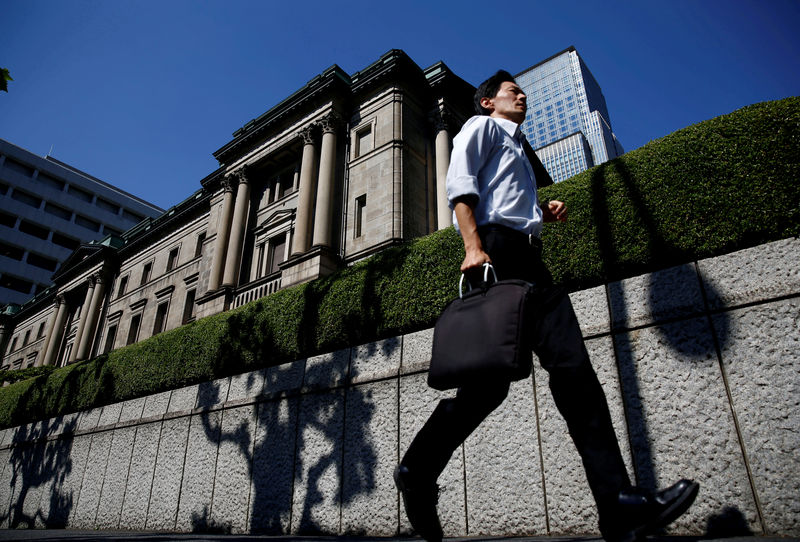By Leika Kihara
TOKYO (Reuters) - The Bank of Japan is leaning toward keeping monetary policy steady next week as stable markets, a truce in U.S.-China trade talks and robust domestic demand give it room to save its dwindling ammunition to battle the next recession, sources said.
Developments since last month's meeting have taken some pressure off the BOJ, with the United States and China agreeing on a temporary pause in a trade war that has hurt global growth.
The BOJ's "tankan" survey showed that while manufacturers were reeling from slumping global demand, capital expenditure and service-sector mood were holding up.
But the decision will be a close call. The BOJ stands ready to act if a flare-up in trade tensions or renewed fears of a disorderly Brexit jolt markets and spark an unwelcome yen spike, say sources familiar with the central bank's thinking.
A fragmented monetary policy board also complicates the debate. While some are wary of the pain additional easing could inflict on Japan's banking sector, at least three in the nine-member team see benefits in acting sooner than later to fend off risks.
Still, a lack of tools left in the BOJ's toolbox and the rising cost of prolonged ultra-low interest rates mean the hurdle for topping up stimulus will be high, the sources said.
"Global risks persist but aren't imposing huge damage on domestic demand yet. Markets are also calm," said one of the sources. "There aren't many factors that justify acting now."
If the BOJ were to ease, the most likely option would be to take short-term rates deeper into negative territory, the sources said on condition of anonymity.
The BOJ may opt for more modest steps, such as tweaking a pledge on how long it will maintain ultra-low rates, if it sees that risks are not big enough to warrant full-blown easing, they said.
"The BOJ still has ammunition in stock. But there aren't that many left," another source said.
MORE EXPLAINING TO DO
The BOJ said last month it would use its Oct. 30-31 rate review to look more closely at whether overseas risks have heightened enough to derail the path toward hitting its 2% price target, stoking market speculation of an imminent easing.
A Reuters poll conducted between Oct. 2-14 showed two thirds of economists expected the BOJ to ease this month.
Despite subsiding overseas risks, BOJ Governor Haruhiko Kuroda has signalled that the central bank has not let its guard down given lingering global uncertainties.
A cut in the International Monetary Fund's global economic forecasts led Kuroda to concede last week that a pick-up in global growth would be delayed.
"On the whole, the world economic outlook...has become less buoyant," Kuroda told Reuters, adding that he had no preset idea on when the BOJ could act.
Any signal from the U.S. Federal Reserve, which meets on Oct. 29-30, on the future pace of rate cuts may also move markets and affect the BOJ's policy decision, analysts say.
Under a policy dubbed yield curve control (YCC), the BOJ guides short-term rates at -0.1% and the 10-year bond yield around 0%. It also buys government bonds and risky assets.
Kuroda has signaled that deepening negative rates will be among key options if the BOJ were to ease. But critics warn that doing so could do more harm than good by hurting commercial banks' profits and discouraging them from boosting lending.
As a more moderate alternative, the BOJ could commit to keeping rates low for longer by tweaking its forward guidance that rates will stay at current ultra-low levels at least until around spring 2020, the sources said.
But any such move would be defined more as a fine-tuning of communication rather than an expansion of stimulus, they said.
In new quarterly forecasts due next week, the BOJ is expected to slightly cut its price estimates but roughly maintain its view that inflation will head toward 2%, the sources said.
If it opts to hold policy steady, the central bank will also use its quarterly outlook report to offer a deeper-than-usual analysis on how overseas risks could affect Japan's output gap and the path toward hitting 2% inflation, they said.

Japan's economy continues to expand moderately as robust domestic demand offsets some of the pain from soft exports. But a sales tax hike that kicked off in October could cool household spending, some analysts say.